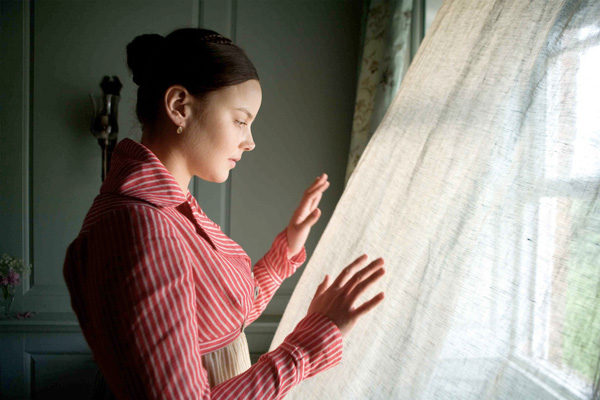Movie review by Greg Carlson
In a recent interview with Maria Garcia in Film Journal International, director Jane Campion invoked the name of Robert Bresson, the colossus of unblinking austerity and scholarship of the soul, whose oeuvre has become a Rosetta Stone for generations of moviemakers. Campion’s “Bright Star,” a love story based on the doomed courtship of Romantic poet John Keats and his neighbor Fanny Brawne, reverberates with many of Bresson’s techniques, and even if Campion lacks the most rarefied of the French master’s gifts, her talents are considerable. “Bright Star” is among the director’s finest films.
Literary superstars, especially tubercular poets who die at 25, defy quiet cinematic portraiture, and Campion wisely filters the consciousness of the narrative through Abbie Cornish’s Fanny Brawne instead of through Ben Whishaw’s John Keats. Cornish is superb, and her performance so sensual it is easy to see how Keats might have fallen easily, speedily in love. The two actors share an inviting chemistry and a smoldering eroticism that allows Campion to perfect the art of suspended and sublimated desire. Few movies manage to effectively translate the emotional resonance of poetry without a share of pretentiousness, but Cornish and Whishaw recite some of Keats’ best known work as though the lines were showers of sparks.
Campion’s sharp eye has often gazed upon strong women who negotiate and subvert expected gender roles with fierce intelligence and reserves of dignity. In “Bright Star,” Campion seizes upon Brawne’s keenness for fashion, imagining the teenager as an artist with a needle and thread whose facility for innovative clothing construction matches Keats’ way with words. Far from reinforcing the old-fashioned concept that relegates supportive young women to homemaker-appropriate pursuits, Campion sees Brawne as Keats’ aesthetic peer. One of the movie’s most potent images reveals an intricately embroidered pillowcase sewn by Fanny for Keats’ consumptive brother.
Campion’s vision of 19th century Hampstead Heath is simultaneously elegant and understated. She directs from her own script (inspired by Andrew Motion’s Keats biography), and makes certain that the measure of daily life in Regency England is just as restrained and chaste as the restricted affair between Brawne and Keats. With the exception of a few sultry kisses, Fanny and John must forego physical contact, but Campion turns the ache to her advantage. In one stirring scene, Fanny transforms her quarters into a lepidopterist’s hothouse, filling the space with delicate butterflies while she swoons on the bed and attempts to articulate to her concerned mother the intensity of her feelings for Mr. Keats.
The brilliance of “Bright Star,” and one of its Bressonian traits, lies in how much Campion leaves unspoken and left to the viewer. Paul Schneider, the American actor who played opposite Zooey Deschanel in “All the Real Girls,” steals several scenes as Charles Armitage Brown, Keats’ best friend and protector. Brown dreads the spell Fanny casts over Keats, convinced that the flirtatious girl will obliterate the poet’s concentration and dilute the quality of his verse. Brilliantly, Campion manages to legitimize Brown’s complaints without turning him into a grotesque or a villain (even though he does impregnate the Irish maid). In an irony surely not lost on Brown, Fanny instead fuels some of Keats’ most brilliant achievements.
